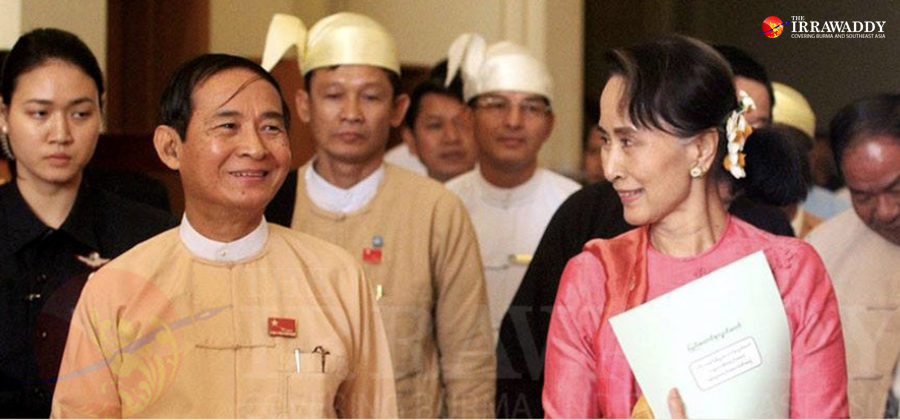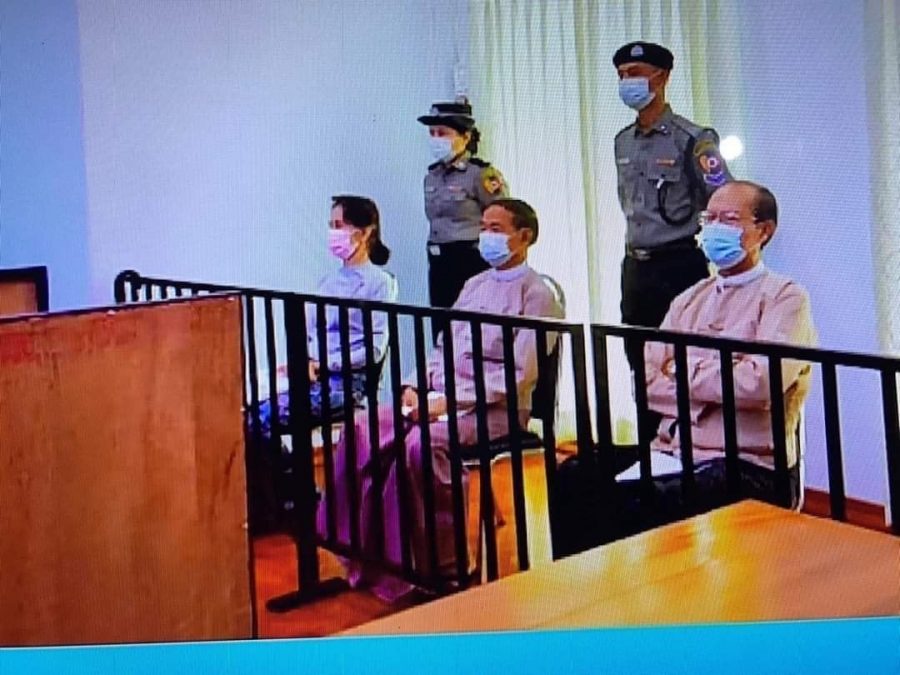Myanmar’s deposed President U Win Myint and State Counselor Daw Aung San Suu Kyi, and Naypyitaw Council chairman Dr. Myo Aung earlier this week pleaded not guilty to charges of incitement brought by the military regime that removed Daw Aung San Suu Kyi’s National League for Democracy (NLD) government in February.
The regime led by coup leader Senior General Min Aung Hlaing has brought 11 charges against Daw Aung San Suu Kyi and two each against U Win Myint and Dr. Myo Aung. It is well known that Daw Aung San Suu Kyi was subjected to decades of oppression by successive military regimes. But legal persecution is not new to U Win Myint and Dr. Myo Aung, either.
However, the detention of Daw Aung San Suu Kyi in an unknown location and the attempt to imprison her on baseless charges indicate that Snr-Gen Min Aung Hlaing is more ruthless than his predecessor, Senior General Than Shwe.
Daw Aung San Suu Kyi was placed under house arrest three times spanning a total of 15 years between 1989 and 2010 by the State Law and Order Restoration Council (SLORC) and its successor, the State Peace and Development Council (SPDC). Deposed president U Win Myint and Dr. Myo Aung were also the political prisoners of previous regimes.

As Daw Aung San Suu Kyi’s popularity grew along with that of the pro-democracy movement in 1988, she was put under house arrest for the first time in July 1989 under Section 10 (b) of the 1975 State Protection Act. The provision carries three years in prison and she was due to be released in July 1992. But in 1991, the regime changed the law and increased the prison term to five years.
The amendment meant Daw Aung San Suu Kyi would be kept under arrest for two more years. Her release was due in July 1994, but the regime refused to free her, saying she had been detained under a decree from July 1989 to July 1990, so that period would not be counted in her five-year house arrest. Thanks to the regime’s crafty interpretation, Daw Aung San Suu Kyi had to spend six years in total under house arrest and was only released in 1995.
In September 2000, Daw Aung San Suu Kyi was forcibly stopped at Yangon General Railway Station as she was attempting to leave for Mandalay to campaign for her party. She was taken back to her home in Yangon’s Bahan Township where she spent one year and eight months in confinement until May 2002, without having committed any offence.
Just before her second house arrest, Daw Aung San Suu Kyi and her entourage, while traveling to Kunchangon and Kawhmu townships, were beaten and placed under house arrest for two weeks. Daw Aung San Suu Kyi was snatched and taken home by six policewomen from Dala on the opposite bank of Yangon. Among those who were placed under 14 days of house arrest was Dr. Myo Aung, who later served as Naypyitaw Council chairman in the NLD government that was ousted this year.
The public support for Daw Aung San Suu Kyi did not wane, despite the regime’s hope that she would fade into obscurity after years of separation from the public. This led to the attempted assassination of the NLD leader while she was on a campaign trip in Tabayin in May 2003. She escaped the attack and was sent to Insein Prison, then again locked up at her house.
Her third house arrest began in May 2003. Under the law, the maximum punishment is five years in prison, but again the regime counted the prison term as starting from May 2004. Then, US citizen John Yettaw trespassed upon her lakeside residence in early May 2009, two weeks before her scheduled release from house arrest.

This illegal visit prompted prosecution of Daw Aung San Suu Kyi under Section 22 of the State Protection Act. People believed the regime used it as an excuse to confine her until the 2010 general election was complete.
Daw Aung San Suu Kyi was detained at the officers’ quarters of the Correctional Department inside Insein Prison and for the first time put on trial. She was sentenced to three years in prison with labor in August 2009.
Consequently, Home Affairs Minister Major General Maung Aung read Snr-Gen Than Shwe’s instruction before the judges, diplomats and journalists that she would only have to serve half of the jail term no matter how many years she was handed by the court. The remainder of the sentence would be suspended and she would be freed from having to serve it if she behaved well. She was placed under house arrest. As scripted and directed by the regime, she was released from house arrest on Nov. 13, 2010, five days after the regime held a general election.
Two years later, Daw Aung San Suu Kyi entered the parliament, which was dominated by the ex-generals. Her NLD won a majority in the general election in 2015 and formed the government for the first time, 25 years after winning the 1990 general election, only for the regime to refuse to hand over power. It was the first civilian government in more than five decades, since the 1962 coup by Gen. Ne Win.
In the 2020 poll, the NLD again secured an electoral mandate to manage the country for five more years. However, the Myanmar military, which has never enjoyed public support and has never been able to remove Daw Aung San Suu Kyi from Myanmar’s political leadership role, seized power in a coup in February this year. She was arrested for the fourth time at the age of 76 and is being held in an unknown location in Naypyitaw
Daw Aung San Suu Kyi is facing 11 charges—including absurd accusations like illegal possession of walkie-talkies and misuse of land for a foundation named after her late mother—a larger number than was brought by former military dictators Senior General Saw Maung and Snr-Gen Than Shwe.
You may also like these stories:
Around 60 Myanmar Junta Troops Killed in Fighting With Resistance Forces
Price of Fuel in Myanmar Has More Than Doubled Since Junta’s Coup
Myanmar Junta Accused of Targeting Civilians with Landmines

















